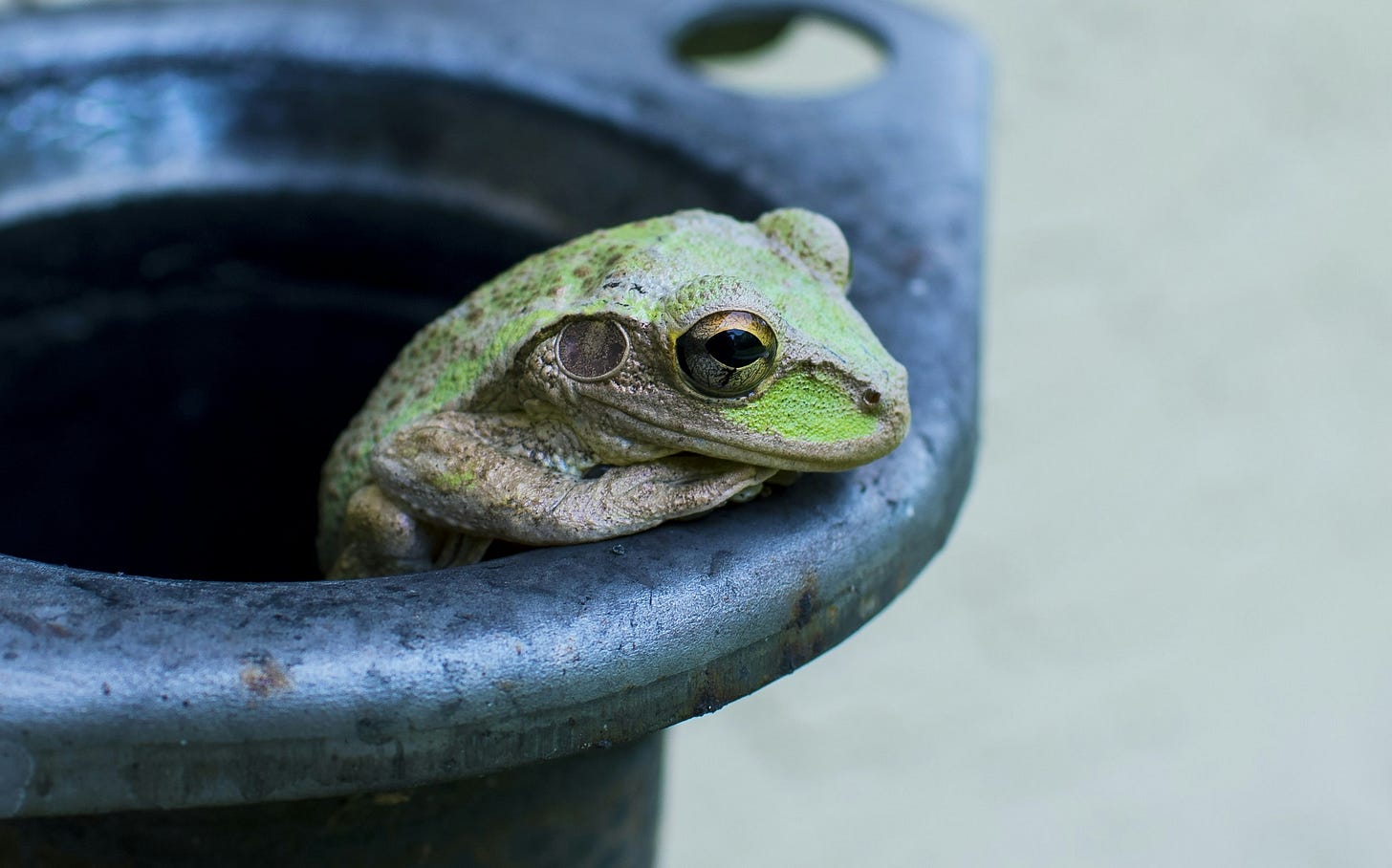On Boiling Frogs And Capitalist Games
We're all playing a game more noxious and deadly than we dare admit
If we were to go back in time and look for when it started, we may not be able to find the moment. It might not even have a specific start date and time, as if one decision or event sets it all in motion. It’s probably more like the proverbial frog unaware that it’s in boiling water (is that even true? And if, so, how did someone find out that it was true - why would anyone do something so arbitrarily cruel?). In this we are told we live and move and have our being - there is nothing to be done to avoid it. We are all infected, all swimming in this water, slowly boiling in this pot.

But if we were to go back in time and look, if not for a starting point, for early signs, then we would find them. In decisions or dreams or hopes or ambitions; in priorities, in how we think of ourselves and what we think of others. Slowly, imperceptibly if you’re on the inside, frighteningly, insidiously inevitable if you are looking on, helpless to do anything about it. Decision piles on decision, dream on dream, priority on priority. In some ways or others, we are all in it, breathing its noxious fumes, asphyxiating under the pressure of the ubiquitous pollutant.
What am I describing? A literal virus? Well, no. But maybe also yes. I’m trying to talk about the way we see and use money, the things and experiences it purchases for us, and the way hyper-capitalism rages like wildfire through every aspect of our lives and society such that extinguishing the fire is impossible - we have to find a way to live with it. I find that often when we try to talk about this there is a knee-jerk reaction; well, comes the response, there’s no other game in town (interesting choice of words there). What do you propose instead? Communism? That’s never worked.
I’m not suggesting that. But we do need to do better at understanding the times in which we live and the effect they are having on us. Jesus kept saying that the Kingdom of God is at hand; we who follow Him are meant to live as citizens of that kingdom. So we need to start by at least understanding the extent to which we are really living as citizens of somewhere or something else. This brings me to the second season of Squid Game, Netflix’s violent, dystopian drama series.
In a neatly counter-seasonal piece of programming, the second season of this show arrived on Boxing Day just gone. It’s Netflix’s biggest-ever show; it’s one of those pieces of pop culture that has truly become a part of the cultural conversation. Even if you don’t watch it or don’t like it, it’s helpful to try to understand it. It’s a South Korean drama series in which people afflicted by severe debt crises across the societal spectrum are lured to play a series of games. What they don’t know until the games (usually variations on typical Korean childhood games) start is that failing to complete a game will mean instant death. As more contestants die, the prize fund for the winners rises, until any very small number of survivors take the lot - personal debt crisis relieved, at a terrible cost.
The second season throws extra elements into the mix; new games, the surviving player from the first season going back in to try to sabotage the game from within, people on the outside trying to find and stop the games, and more about one or two of the guards responsible for overseeing and (literally) executing the games, and what has bought them to this point. After each game, surviving contestants can vote by simple majority to finish or continue the contest.
It’s in this last point - the voting - that we see most clearly what this show is trying to communicate. Quite clearly, from the beginning, it’s a critique of our economic systems - the devastating, unbridgeable gap between rich and poor; the things people will do to bridge the gap or secure themselves on the other side of it - and the effect this has on them. The shame debt and poverty so easily bring with them; and, in this, element of voting, the way our hyper-capitalist mindset even infects our dearly held basic tenets of democracy. Democracy is the way to freedom, we are told; our governments are keen to export it (isn’t ‘export something you do with goods and services, not systems of government?). Here, though, is laid bare that financially incentivised self-interest is the primary driving force of even this; people will risk their own lives and condemn others to almost certain death for the possibility of more money or release from their own debtors’ prison.
Store up treasure in heaven; live as citizens of the kingdom of God. But how, then do I vote? How, then do I save and spend my money (and it is most definitely my money, isn’t it?)? How, then do I see someone - myself or another - who is failing or flailing in the undertow of this onrushing tide of consumption and spending, saving and hoarding?
Where my treasure is, there will be my heart. What is my treasure? What do I look for, plan for, and seek with all my heart and mind? And to what do I give my energy and time, hopes and dreams? Am I playing a game with no real winner, or am I a citizen of somewhere else? I will most likely embrace the answers even less than the questions.



